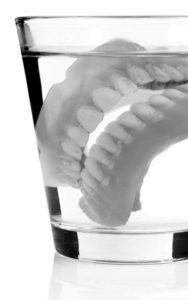
For a number of reasons, adults occasionally lose teeth. Some more than others.
Although the expectation in the U.S. is that it’s normal to lose teeth as we age, it certainly shouldn’t be. Through proper oral hygiene at home, regular dental visits, a healthy diet, and keeping the mouth moist, good oral health – and keeping natural teeth – is achievable.
Yet, tooth loss as we age is more common than not. More than 13 percent of adults between the ages of 65 and 74 have lost all of their teeth. This percentage doubles after the age of 75. (https://www.cdc.gov/oralhealth/basics/adult-oral-health/adult_older.htm)
This is an especially troubling trend, especially since older adults make up a significant portion of the population. According to the Centers for Disease Control & Prevention (CDC), the number of US adults ages 65 years or older is expected to comprise 24 percent of the overall population by 2060.
The CDC also cautions, “Having missing teeth or wearing dentures can affect nutrition, because people without teeth or with dentures often prefer soft, easily chewed foods instead of foods such as fresh fruits and vegetables.”
While replacing teeth can be done rather inexpensively through dentures, replacing the presence of teeth is very different from replacing their function. Do dentures restore the ability to bite and chew thoroughly and comfortably? With dentures, can laughing and chatting with others occur with confidence? And, even more importantly, do dentures support good overall health?
The downfall of dentures lies essentially in what they fail to do below the gums, where natural tooth roots were once held. This gum-covered arch of bone (the upper and lower jaw bone) is designed to give natural teeth a sturdy foundation. This makes for dependable, stable biting and chewing.
Yet, just as natural teeth are dependent upon the jaw bones for stability, this foundation’s mass is dependent upon the roots of teeth.
Teeth are essentially structures of bone. However, each tooth has an inner chamber where nerves and blood vessels are housed. This chamber extends through the tooth root(s), connecting the tooth to the jaw bone. The roots also provide stimulation to the bone along with nourishment. Without the presence of a tooth’s roots, the bone fails to thrive.
The jaw bone, without tooth roots, will begin to decline in mass. This process is known as resorption and is like a ‘melting away’ of bone. As the supportive bone structure shrinks, the pressure of wearing dentures actually speeds up the rate of bone loss.
When dentures are first made, they are conformed to fit the specific curves and arches of the existing bone ridge where teeth were once held. As resorption progresses, the denture will begin to slip when eating or rub uncomfortable sore spots on tender gums. At first, more-frequent applications of denture pastes may help. Eventually, they’ll be of little help.
Long-time denture wearers often alter their food choices to accommodate their less-than-dependable ability to chew. Fresh fruits and vegetables are bypassed for softer, cooked versions. Pasta is chosen over protein-rich meats. Grains and seeded foods conjure up fear of a seed being caught under the denture, piercing painfully in tender gums. Dentures are hardly supportive to good digestion or nutritional health.
There is also concern surrounding their cleanliness. The gum-colored base of dentures is made up of a porous material. These pores have been found to house bacterial organisms. According to RDH magazine, “research has isolated Staphylococcus aureus, Streptococcus mutans, Klebsiella pneumoniae, Escherichia coli, and hundreds of other garden-variety germs in acrylic dentures.” (https://www.rdhmag.com/patient-care/xerostomia/article/16407070/5-things-you-should-know-about-dentures)
Aging adults should be made aware that dentures can literally make you sick. In a study of 524 seniors (average age approx. 88), Japanese researchers noted higher incidences of pneumonia-associated events occurred among the 453 participants who were denture wearers. Nearly 41 percent wore their dentures during sleep and showed higher risk for pneumonia than those who removed their dentures at night. (https://www.rdhmag.com/infection-control/article/16404123/dentures-and-aspiration-pneumonia)
Having good oral health has proven to affect good overall health. However, the appearance of a smile is also important. Because of the accelerated pace of bone loss from wearing dentures, facial changes begin to show through. At first, there may be deep wrinkles around the mouth. The corners of the mouth turn downward, even in a smile.
As bone loss continues, jowls form from the detachment of facial muscles. The chin takes on a pointed look and the mouth seems to collapse into the face. These changes tend to project a facial appearance that is far older than one’s actual years. For many people, looking old makes them feel old.
The choice of dentures, for most patients, is made because they provide the cheapest option to replace teeth. With all the arguments against dentures, we DO place dentures in people who (1) prefer them for their lower cost and understand the repercussions; or (2) want to have them secured to dental implants.
Denture wearers have been pleased to learn that their “wobbly” or “slippery” denture can be firmly secured by 4-6 strategically placed dental implants. In some cases, we are able to use the patient’s existing denture.
The goal is to discuss your options for tooth replacement so you can understand ALL the choices before you. We believe that our patients desire to understand all surrounding what is appropriate for their specific needs and goals. For most, the cost of dentures secured to implants is made affordable through easy, monthly payment plans. Treatment can also include oral or I.V. sedation (twilight sleep).
Learn your options and how you can avoid or overcome the frustrations of dentures. Call for a free consultation: (586) 739-2155 or tap here to begin.